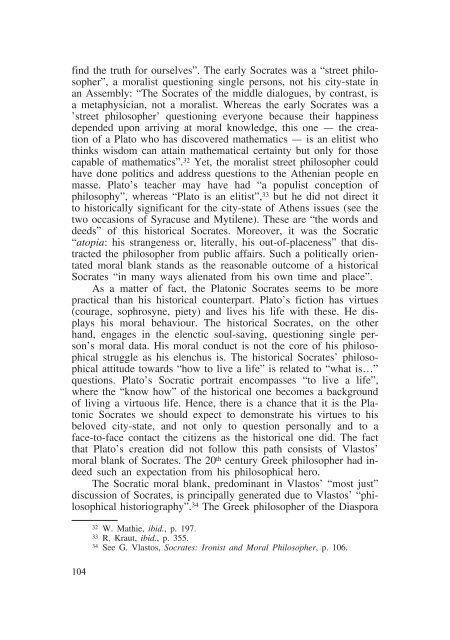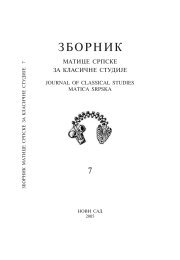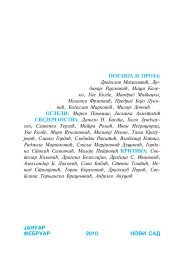You also want an ePaper? Increase the reach of your titles
YUMPU automatically turns print PDFs into web optimized ePapers that Google loves.
find the truth for ourselves". The early Socrates was a “street philosopher",<br />
a moralist questioning single persons, not his city-state in<br />
an Assembly: “The Socrates of the middle dialogues, by contrast, is<br />
a metaphysician, not a moralist. Whereas the early Socrates was a<br />
'street philosopher' questioning everyone because their happiness<br />
depended upon arriving at moral knowledge, this one — the creation<br />
of a Plato who has discovered mathematics — is an elitist who<br />
thinks wisdom can attain mathematical certainty but only for those<br />
capable of mathematics". 32 Yet, the moralist street philosopher could<br />
have done politics and address questions to the Athenian people en<br />
masse. Plato's teacher may have had “a populist conception of<br />
philosophy", whereas “Plato is an elitist", 33 but he did not direct it<br />
to historically significant for the city-state of Athens issues (see the<br />
two occasions of Syracuse and Mytilene). These are “the words and<br />
deeds" of this historical Socrates. Moreover, it was the Socratic<br />
“atopia: his strangeness or, literally, his out-of-placeness" that distracted<br />
the philosopher from public affairs. Such a politically orientated<br />
moral blank stands as the reasonable outcome of a historical<br />
Socrates “in many ways alienated from his own time and place".<br />
As a matter of fact, the Platonic Socrates seems to be more<br />
practical than his historical counterpart. Plato's fiction has virtues<br />
(courage, sophrosyne, piety) and lives his life with these. He displays<br />
his moral behaviour. The historical Socrates, on the other<br />
hand, engages in the elenctic soul-saving, questioning single person's<br />
moral data. His moral conduct is not the core of his philosophical<br />
struggle as his elenchus is. The historical Socrates' philosophical<br />
attitude towards “how to live a life" is related to “what is…"<br />
questions. Plato's Socratic portrait encompasses “to live a life",<br />
where the “know how" of the historical one becomes a background<br />
of living a virtuous life. Hence, there is a chance that it is the Platonic<br />
Socrates we should expect to demonstrate his virtues to his<br />
beloved city-state, and not only to question personally and to a<br />
face-to-face contact the citizens as the historical one did. The fact<br />
that Plato's creation did not follow this path consists of Vlastos'<br />
moral blank of Socrates. The 20 th century Greek philosopher had indeed<br />
such an expectation from his philosophical hero.<br />
The Socratic moral blank, predominant in Vlastos' “most just"<br />
discussion of Socrates, is principally generated due to Vlastos' “philosophical<br />
historiography". 34 The Greek philosopher of the Diaspora<br />
104<br />
32 W. Mathie, ibid., p. 197.<br />
33 R. Kraut, ibid., p. 355.<br />
34 See G. Vlastos, Socrates: Ironist and Moral Philosopher, p. 106.

















